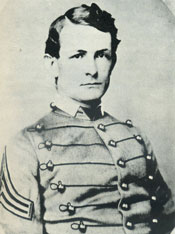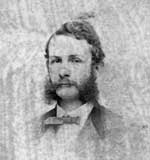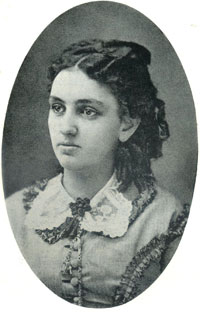 |
 |
West Point Cadet |
Post-war (date ?) |
Letters and History of
1st Lieutenant Tully McCrea
Battery M, First U.S. Artillery
 |
 |
West Point Cadet |
Post-war (date ?) |
Assigned to an artillery battery with the Army of the Potomac, 2nd Lieutenant McCrea saw action at the battles of Antietam, Fredericksburg and Gettysburg. At Gettysburg, his battery, Battery I, 1st U.S. Artillery, was stationed on Cemetery Ridge in Ziegler's Grove, and helped repulse Pickett's Charge. When the Confederates retreated, McCrea was the last officer in his battery left standing in both his battery and that of Cushing's of the 4th U.S. Artillery. For a short time, Lt. McCrea commanded both.
Lieutenant McCrea hoped, due to his experience, he would permanently command his battery. However, another artillery lieutenant, who just happened to be a general's son, was given command. Annoyed, McCrea requested transfer to another battery in his regiment. This battery was assigned to the Department of the South, in Hilton Head, South Carolina. McCrea transferred to that army in November 1863.
As a result, during the Battle of Olustee, McCrea, now a 1st Lieutenant---effective 4 November 1863, served with Battery M, 1st U.S. Artillery. He was twenty-four years old. In the following letter he writes Belle, his first cousin and then sweetheart, before leaving for Florida.

South Carolina, February 5, 1864
"A large expedition is leaving here today. I think the destination is somewhere in Florida, but that remains for us to find out after we arrive there. There are a large number of vessels in the harbor waiting to load the troops and I suppose we will start tomorrow. General Seymour, my favorite general here, is in command and if we have an opportunity there will be some hard fighting and someone will be hurt."
Little did Lieutenant McCrea know at the time that he would be a "someone," as he received wounds in both legs. He described them to Belle as "a compound fracture of the left and a flesh wound through the fleshy part of the right, both below the knee." However, he recovered, and was promoted to brevet major, retroactively as of February 20, 1864.
While not entirely sure why McCrea considered Seymour his "favorite general here," it may be due to two reasons. First, When he arrived at Hilton Head, McCrea was assigned to General Seymour's staff for a while. Second, McCrea had encountered Seymour at West Point, soon after the war began. Seymour was a captain at the time and had served at Fort Sumter during the Confederate bombbardment. When the Union troops were released and sent north, Seymour went to West Point. As McCrea wrote to Belle:
West Point, April 24, 1861
"We had three serenades here during the past week. On Sunday night, or rather Monday morning, for it was after twelve o'clock, some of the cadets serenaded Lieutenant McCook [later Major General USA], who was leaving for Ohio to muster the Buckeye volunteers. On Tuesday night we serenaded Captain Seymour, one of the heroes of Fort Sumter, who was here visiting his father-in-law, Professor Weir. It was a clear moonlight night and there were about fifty cadets in front of the house when the Captain came to the window and made us a patriotic speech. We could see his features very well and it looked like he had had a hard time in his prison at Fort Sumter. When he made his appearance at the window the cadets greeted him with a round of applause and applauded everything that he said from beginning to end. But he would have been applauded if he had not said a word, for actions speak louder than words, and his actions at Fort Sumter had preceeded him and endeared him to every true American Heart."
McCrea finishes by stating on Friday the cadets seneraded Lieutenant Fitzhugh Lee [later Major General CSA---Civil War, and still later Major General USA---Spanish-American War]. Lieutenant Lee, a nephew of Robert E. Lee, was McCrea's West Point company commander, and McCrea expresses his great admiration for Lieutenant Lee in this letter.
After arriving in Florida, Tully wrote Belle:
12 February 1864
"I had a very hard time at Hilton Head embarking the battery on transports, having to work all night. After we left Hilton Head we found out that we were destined for Jacksonville, Florida, which is on the St. John’s River, about forty miles from its mouth. We arrived at the mouth of the river about twenty-fours hours after leaving Hilton Head, and in trying to cross the bar at the entrance to the river stuck fast in the bar. We were compelled to remain there all day waiting for the tide to rise and succeeded in crossing that night. We arrived in Jacksonville about twelve o’clock the next day. As soon as we had disembarked. We were started for Camp Finnegan, about nine miles from Jacksonville, where the rebels had about six hundred men and where we expected to have a fight."We arrived at Camp Finnegan about midnight and found the rebels had fled only a few hours before, leaving us in possession of everything. They left so hurriedly that they did not have time to collect all their men and when ours entered their huts and informed them that they were prisoners, they were perfectly surprised. A whole family was captured in one of the huts. In this family was an old woman, who was the most perfect Meg Merriles that I ever saw. Her face was full of wrinkles and from sitting around a pine fire her face was full of black soot. Altogether she was the most perfect old hag that I ever saw. The soldiers here had left coops full of chickens and turkeys and our men had a perfect carnival and feasted on poultry. We captured seven cannon and a large quantity of small arms. We pushed ahead every day until we arrived here last night, fifty-two miles from Jacksonville. We have been subsisting almost entirely on the country and find it very slim living. We have named this camp ‘Camp Misery’ because we are halting here in the rain without anything to eat, either for ourselves or our horses. I find that campaigning is not done here as it is in the Army of the Potomac, with system and order."
At Olustee, Tully’s gun section was detached by Captain Langdon to the right where help was needed. During the battle, Battery M suffered 32 casualties, with eight killed and a loss of three out of four guns, two limbers and two caissons. Thirty-nine horses had been disabled.
General Seymour praised the artillery which had to work in and out of the trees, with some guns getting hung up. The artillery was so close to the action many of the men and horses were gunned down by Confederate infantry. In his official report, Seymour stated the artillery:
"...was worked by it admirable officers with perfect tenacity and coolness. An unremitting fire was maintained upon the enemy’s infantry with the very best effect... The artillery, as might have been expected, performed its part with great honor; guns were never better served, or under more trying circumstances. Exposed greatly to sharpshooters, this force suffered correspondingly..."
Since Tully was wounded, he asked a fellow officer to write to a close friend of his at home, so the friend could break the news to Belle. Peter Michie, of the Engineers, wrote on his behalf:
"I saw McCrea just as he was bringing his guns into action and I could not help feeling glorious myself at the gallant manner in which he did it. Most of his men and horses were killed or wounded before he was carried from the field. He has two wounds, one in each leg. That in the right leg is a flesh wound in the calf, the other, I think, is a little more serious but not by any means so as to affect the use of his leg hereafter. He has behaved most gallantly and has won the envy and admiration of all about him."
In letters to Belle, Tully wrote:
1 March, hospital, Beaufort, South Carolina
"I was shot through both legs—compound fracture of the left leg and a flesh wound through the fleshy part of the right, both below the knee. Neither wound is dangerous, but the one in the left leg has been very painful. I was compelled to ride two nights and one day over the rough roads in an ambulance and all the next day was at sea in a steamer bound for this place. The torture was very great and I had never before suffered such physical pain. As soon as I arrived here everything was done that was possible and I have received every attention from kind friends among whom are several ladies. I have everything that I can desire and, as I am now getting over the prostration caused by the bad journey, I am feeling quite comfortable and getting along famously."
10 April, hospital, Beaufort, South Carolina
"Last week a piece of my pants, carried in by the ball, was taken from the wound. After that it healed rapidly. .... The day before yesterday was an eventful one in the history of my confinement. The familiar old box that has held the broken bones to their place for the last seven weeks was removed. I bit it a hearty and, I hope a lasting farewell. My leg was then laid on a pillow. It felt rather queer for some time to have my leg free again from durance vile. This morning I was taken from the bed that I have been on so long and placed on a more comfortable one. I suffered some pain in the removal, but was repaid when the doctors turned me over and allowed me to lie on my side. Only those who have been on their backs seven weeks can realize the pleasure I felt. I remained in this position only an hour when my leg began to swell and was greatly inflamed. As I write now at sunset, I am beginning to feel quite comfortable again. I was in hopes that I was going to sit up this week but will have to delay it a few weeks more. I think it is possible that I may go north in the steamer of the 20th, but certainly the 28th."
However, due to his wounds, Tully would not be sent north until June 1864. By late summer he was back in the hospital for more treatment. He would be slightly lame for the rest of his life, but he still had his leg.
While recovering from his wounds, Lieutenant McCrea was assigned duties as Acting Assistant Professor of Geography, History and Ethics at West Point during 1864. He soon switched to mathemathics and is listed as a professor and historian of mathemathics from 1864-1866.
By this time, Tully and Belle had broken off their relationship. In a series of poignant letters sent to each other, Tully stated his desire to stay in the Army. As a cadet, knowing he would be assigned to frontier posts, at low pay, he had told Belle he did not know when he could afford to marry and support a wife. While this, and their close kinship, was not a problem for Belle, she was in frail health, and feeling she would be a burden to her cousin, decided to discontinue their understanding for eventual marriage. Tully protested, but Belle "stuck to her guns."
Belle married in time to a local shoe merchant, who was also a Civil War veteran. But with the birth of their son in 1874, she became a semi-invalid, walking with difficulty, and confined for many years to a wheel chair: never moving far from her home. Yet she lived longer than Tully, dying in 1929 at the age of 85.
After the Civil War, Major McCrea reverted, as did so many others, to his permanent rank in the army. As such, 1st Lieutenant McCrea was later stationed at Madison Barracks in Sacketts Harbor, New York. There he met his future bride, Harriet Camp. They were married on 20 May 1868. McCrea remained in the army and retired in 1903 as a brevet brigadier general with 40 years of service, not including his time as a cadet at West Point. For most of his career, Tully was assigned to the artillery. In 1896, he wrote a paper on "Light Artillery: Its Use and Misuse," (Journal of the Military Service Institute of the United States, Vol 22:519-533) based on his experiences during the war and after.
After Tully's marriage, Belle's and his letters to each other ceased for awhile. Then, in 1876, they began to write each other again, with Belle's first writing to Tully, using as an excuse, about the death of one of their cousins. Tully responded with news of his movements and daughter, requesting Belle to visit them. But Belle never visited and Tully never returned to his home or to see her, but the letters continued until 1916, when "illness interupted the exchange." (Dear Belle, p. 240)
After retiring, Tully and his wife moved to Atlantic City. New Jersey. He died in 1918 at the age of 79, joining his wife who had died the year before. They had one child, a daughter named Alice.
For more on Tully McCrea, see the Web sites below. For a detailed history, see the book Dear Belle: Letters from a Cadet and Officer to his Sweetheart, 1858-1865. The letters and numerous details on this page are from the book.
External Web sites related to the Battle of Olustee
Lt Tully McCrea at Antietam
Lt Tully McCrea, eyewitness to Pickett's Charge at Gettysburg
Tully McCrea Facebook page
Tully McCrea genealogy page
BGen Tully McCrea's West Point grave site.
Other Letters from Olustee
Battle of Olustee home page
http://battleofolustee.org/